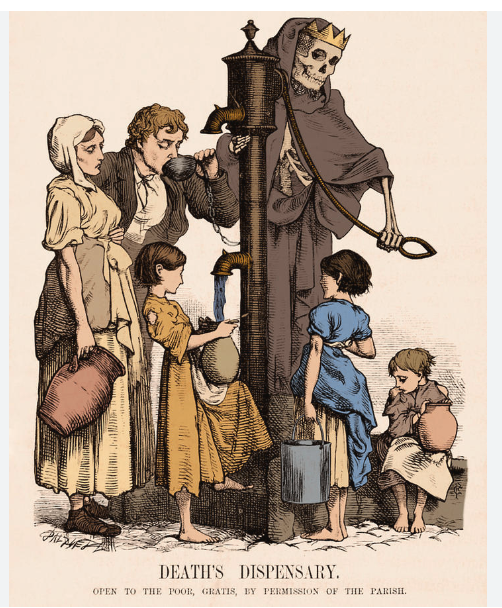Diarrhea and Constipation
1/74
There's no tags or description
Looks like no tags are added yet.
Name | Mastery | Learn | Test | Matching | Spaced |
|---|
No study sessions yet.
75 Terms
Diarrhea
An increase in stool frequency (more than 3x a day) or loose/watery stools that can be self-limited to severe (most likely infectious)
14 days or less
Acute diarrhea is classified by
14-30 days
Persistent diarrhea is classified by
more than 30 days
Chronic diarrhea is classified by
Inflammatory
Which type of acute diarrhea am I describing - bacteria/toxin invades mucosal tissues causing damage and likely systemic illness characterized by bloody stools, fecal leukocytes, and fevers
Non-inflammatory
Which type of acute diarrhea am I describing - bacteria/toxins do not invade or lead to the breakdown of the mucosa (no blood or fecal leukocytes)
Norovirus, rotavirus
Types of viral gastroenteritis
Norovirus
The most common cause of the stomach bug that is common on cruise ships, daycares, and schools
Rotavirus
Which type of viral gastroenteritis is most likely found in infant and young kids (daycare, school)
giardia, cryptosporidium
Types of protozoal noninflammatory acute diarrhea
Giardia
Which type of protozoal noninflammatory acute diarrhea is commonly associated with untreated water when camping, daycares or schools - spreads quickly (NO blood or leukocytes)
Cryptosporidium
Which type of protozoal noninflammatory acute diarrhea is commonly associated with untreated water when camping, and is largely an opportunistic infection affecting immunosuppressed individuals (think HIV)
Bacillus cereus, clostridium perfinges, staph aureus
Types of bacterial non-inflammatory acute diarrhea that have PREFORMED ENTEROTOXINS
Staph aureus
20 y/o male presents to the ED for abdominal pain and cramping. He also reports N/V/D, he states that this started 1-6 hours after eating his meat, eggs, and dairy → what type of bacteria are you thinking?
Bacillus Cereus
What type of bacterial non-inflammatory acute diarrhea is associated with rice, leftovers, sauces, soups, and gravies that were left out of the fridge too long → onset 30min - 6hr (emetic) OR 6-15 hours (diarrheal)
Clostridium perfringes
What type of bacterial non-inflammatory acute diarrhea is associated with beef, poultry, and gravy → onset of diarrhea and cramping w/in 6-24 hours
E.coli, vibrio cholerae
Types of bacterial non-inflammatory acute diarrhea that produce enterotoxins
E. coli
What type of bacterial non-inflammatory acute diarrhea is associated with undercooked ground beef, unpasteurized milk/juice, contaminated water → onset of diarrhea and cramping within 1-10 days
Vibrio Cholerae
What type of bacterial non-inflammatory acute diarrhea is associated with fecal contamination → onset of profuse, “rice-water” stools within 3 hours-5 days

CMV, entamoeba hystolytica (protozoa), vibrio parahaemolyticus (cytotoxin producing), C.diff (cytotoxin producing), E.Coli 0157:H5, Shigella (mucosal invasion), Campylobacter jejuni (mucosal invasion), Salmonella (mucosal invasion), Yersinia enterocolitica (mucosal invasion), Listeria (mucosal invasion)
Types of inflammatory acute diarrhea
CMV
Which type of inflammatory acute diarrhea is more common in immunocompromised patients
entamoeba hystolytica
Which type of inflammatory acute diarrhea is due to a parasite from untreated water
Vibrio parahaemolyticus
Which type of inflammatory acute diarrhea is associated with contaminated oysters or shellfish → onset of 2-24 hours
Clostridium difficile
Which type of inflammatory acute diarrhea is an opportunistic infection associated with antibiotic use (clindamycin)

E.coli 0157:H5
Which type of inflammatory acute diarrhea is associated with undercooked ground beef → onset is 2-24 hours (toxin can lead to sepsis or death)
Shigella
Which type of inflammatory acute diarrhea is associated with sandwiches, salads and raw foods that made contact with an infected person?
Campylobacter jejuni
Which type of inflammatory acute diarrhea is associated with undercooked poultry, unpasteurized milk, and contaminated water → can lead to Guillain Barre Syndrome
Salmonella
Which type of inflammatory acute diarrhea is associated with undercooked poultry or eggs, unpasteurized milk or juice, cheeses, contaminated veggies, and contact with reptiles and amphibians?
Yersinia enterocolitica
Which type of inflammatory acute diarrhea is associated with undercooked pork
Listeria
Which type of inflammatory acute diarrhea is associated with lunch meats, hot dog, soft cheeses → presents with fever, stiff neck, confusion, vomiting
CBC, CMP, Stool (leukocytes, cultures, assay for C.diff, ova/parasite if longer than 10 days, PCR)
20 y/o male presents to the ED for abdominal pain and cramping. He also reports N/V/D, he states that this started 1-6 hours after eating his meat, eggs, and dairy. What diagnostics do you want?
tachycardia, hypotension, orthostatic hypotension, dry mucous membranes
Signs of dehydration to watch out for in diarrhea
Fluids, antidiarrheal medications (loperamide - only mild-moderate disease, risk of toxic megacolon), probiotics
20 y/o male presents to the ED for abdominal pain and cramping. He also reports N/V/D, he states that this started 1-6 hours after eating his meat, eggs, and dairy. Labs are negative. What is your treatment plan?
Fever, 6+ stools/day, bloody stools, immunocompromised peeps, significant dehydration, 70+ y/o
Empiric abx for acute diarrhea should be considered IF → otherwise wait for labs
Azithromycin, ciprofloxacin
Which empiric abx should you pick for acute diarrhea
Chronic diarrhea
Increased stool frequency of more than 3/day, stool weighing more than 200 g/day, and decreased fecal consistency occuring over a 4 week period
Watery (osmotic, secretory), bloody/pus (inflammatory), fatty (pancreatic insufficiency)
Classifications of chronic diarrhea
Cholinesterase inhibitors, SSRIs, PPIs, ARBs, NSAIDs, metformin, allopurinol, orlistat
Common medications that can cause watery diarrhea
Malabsorption syndromes (most common - presents abdominal distention, bloating, and flatulence)
What may cause osmotic (increased osmol gap) watery stools
Endocrine tumors (stimulate intestinal or pancreatic secretion), bile salt malabsorption (stimulating colonic secretion)
What may cause secretory (normal osmol gap) watery stools
hyperthyroidism, DM
What systemic diseases may cause watery stools
IBS (most common in young adults), functional diarrhea (no abnormal findings)
What motility diseases may cause watery stools
UC, CD, Chronic C. diff or giardia
What causes blood or pus in the stools in inflammatory chronic diarrhea
CBC, CMP, TSH, Vitamin D and A, INR (vitamin K), ESR, CRP, IgA-tTG (if you think celiac), Stool (culutes, ova, parasites, fecal fat, leukocytes, electrolytes, fecal antigen detection for Giardia and histolytica), PCR, colonoscopy with mucosal biopsy, upper endoscopy
45 y/o female patient presents to the clinic for diarrhea that has been going on for the last 4 weeks. She notes that she has been running to the bathroom at least 4 or 5 times a day. She notes that the odor of her stools has changes and that they are greasy. What diagnostics you want?
Loperamide, Codeine and deodorized tincture of opium, clonidine, octreotide
Treatment game plan for chronic diarrhea
Traveler’s diarrhea
Diarrhea that presents 2-10 days into travel (change in climate, sanitation, social conditions) usually due to E.coli, shigella, camplylobacter
Should resolve in 1-5 days, maintain hydration, bismuth subsalicylate, loperamide
27 y/o female presents to the clinic for diarrhea, she states that she is “running to the bathroom at least 5 time a day.” She states that she is new to the area and has been visiting her mother the last few days. She also reports abd cramping and N/V. Vitals WNL. What’s your treatment plan?
Hydration, ciprofloaxacin/azithromycin
27 y/o female presents to the clinic for diarrhea, she states that she is “running to the bathroom at least 10 time a day.” She states that she is new to the area and has been visiting her mother the last few days. She also reports abd cramping that has been getting worse and N/V. Vitals are stable with the exception of a 103.2 temp. What is your treatment plan?
colonic motility, water, fiber, intact and properly functioning anal sphincters and pelvic floor muscles
Key factors for normal elimination of stool
involuntary and voluntary (assisted by relaxation, deep breathing, and posture)
Describe the normal colonic excretion
Constipation
Infrequent bowel movements or difficult passage of stools (<3 per week) that is more common in women and is often idiopathic → BIG issue in infants and elderly
Encopresis
A variant of constipation that can result in soiling of clothing when impacted stool collects in the colon/rectum creating an overflow of liquid stools that leaks → usually due to voluntary retention (in children 4+)
Primary (not a complication); secondary (complication of another disorder)
Etiologies of constipation
slow colon transit (up to 72 hours - idiopathic, women), Defecatory disorders
Primary constipation etiologies examples
Neuological disorders, myopathies, electrolyte abnormalities, opiates, colon lesions and cancers
Secondary constipation etiologies examples
No enough fiber, poor bowel habits, hypothyroidism, hyperparathyroidism, DM, hypokalemia, hypercapnia, uremia, Neurological disorders, anticholinergics, diuretics, CCB, psych meds, rectal prolapse/stricture/fissure, colonic mass/obstruction, pelvic floor dyssynergia (anismus), IBS
Common etiologies of constipations
psychosocial issues, create normal toilet habits, high fiber diet, exercise, increase fluids, trial of fiber (1st line - bran powder, psyllium, methylcellulose, calcium polycarbophil, guargum)
35 y/o female presents to the clinic for “feeling bloated.” She also reports abdominal cramping that worsens after eating and comes in waves. On physical exam you note hyperactive bowel sounds that progress to hypoactive and mild distended abd tenderness. On DRE there is no impacted stool in the vault. What are some dietary and lifestyle changes we could recommend?
gas and bloating (methylcellulose less, calcium polycarbophil (NO GAS))
ADRs for fiber laxatives
Age over 50, reports of blood from rectum or in stools, weight loss, FHx of colon cancers or IBD, signs of systemic disease, severe abdominal tenderness, guarding, and rebound, grossly bloody DRE, FOBT+, FIT+,
Constipation red flags that are indications for labs and imaging
DRE
ALL CONSTIPATION WORK UPS INCLUDE
CBC, CMP, TSH, FIT, FOBT, Colonoscopy (#1 draft pick for red flags), sigmoidoscopy, ABD x-rays, CT with contrast (undifferentiated ABD pain with constipations)
35 y/o female presents to the clinic for “feeling bloated.” She also reports abdominal cramping that worsens after eating and comes in waves and that she’s loss 15 lbs. On physical exam you note hyperactive bowel sounds that progress to hypoactive, a palpable mass in the LLQ, and severe abd tenderness. On DRE there is no impacted stool in the vault but there is gross blood. What diagnostics do you want?
Anal manometry with balloon expulsion test, defecography, radiopaque markers
Specialized test for constipation
Stool softeners (Docusate sodium, mineral oil)
What can we use in constipation to soften the stool if straining is required to defecate
pneumonia if aspirated (mineral oil)
ADRs for Stool softeners
Osmotic laxatives (Mg Hydroxide, lactulose, PEG (chronic))
What treatment for constipation increases the secretion of fluid into the colon via large indigestible molecules in the meds → nonresponders to fiber and stool softeners
Cramping, bloating (less with PEF), gas (lactulose), PEF
ADRs for osmotic laxatives
Stimulant laxatives (bisacodyl, cascara, senna)
What treatment for constipation can be used for the incomplete response to osmotic laxative - rescue med (not for long term), bloating and cramping are common due to irritation of the bowel
cramping
ADRs for Stimulant laxatives - avoid daily use
Lubiprostone ($$$), linaclotide
What treatment for constipation increases intestinal Cl secretion resulting in increased fluid resulting in increased fluid in the colon and faster colon transit
Nausea, C/I in pregnancy, NOT for peds (linaclotide)
Side effects for Lubiprostone and linaclotide
enema (water, sodium phosphate, mineral oil)
What treatment for constipation works fast (15-60 min) and is often used with digital disimpaction
Mu-opioid receptor antagonist that doesn’t affect anything outside the GI tract
For opioid induced constipation → what are we using
Fecal impaction (MUST be disimpacted with digit before oral medications)
Impaction of stool in the rectal vault that is causing an obstruction - may cause diarrhea overflow
hemorrhoids (most common), anal fissures, rectal prolapse, laxative abuse, toxic megacolon, fecal impaction, may exacerbate cardiac and cerebral vascular disease
Constipation complications
diverticulitis, IBS, IBS, bowel obstruction, intra-abd infection, cancer
DDx of constipations